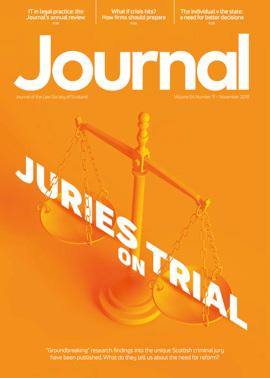Working out welfare

Case management
A number of observations regarding case management are made in the decision of the First Division in RG v Glasgow City Council [2019] CSIH 45 (27 August 2019). Whilst these may apply particularly to applications for permanence orders, it does seem to me that they have a wider influence. Lord President Carloway observed first that in relation to the issue of res judicata, the requirement that the parties were the same was satisfied if the interest of the parties in the actions was the same. In considering the media concludendi, the question was, “What was [previously] litigated and what was decided?” The interests of the local authority and the reporter might well be the same, as they were manifestations of the state.
The Lord President then observed that the court had discretion as to how an inquiry before it would be conducted. Thus at a pre-proof hearing in a permanence application, the court was entitled to determine on what matters evidence was required. If the same or substantially the same evidence was to be led on a matter previously determined, with the intention of inviting the court to come to a different conclusion, a court would be perfectly entitled to refuse to hear such evidence. This might not be the case if a plea of res noviter veniens ad notitiam was tabled or an action of reduction was anticipated. In actions involving the welfare of a child, it was not in the child’s best interests for a decision to be reached on erroneous facts. It also was inconsistent with those interests if the decision was not reached expeditiously. The balancing of these matters might well determine whether evidence on a point was led or not.
Family actions
The resolution of disputes involving children on occasions does not fit comfortably within the court process, as a consequence of the desirability of flexibility. In such circumstances, innovative approaches may be adopted by a court, which whilst well intentioned, fall foul of the rules of procedure and indeed the ultimate destination of a litigation, namely a judgment following proof. Another example of this is the decision in LRK v AG [2019] SAC (Civ) 33 (2 October 2019). After a day’s proof, a further diet of proof was assigned. At that diet the sheriff, after hearing further evidence and submission, made an award of interim contact, adjourned the proof further to a date to be afterwards fixed and assigned a child welfare hearing to take place immediately after that adjourned diet. A further interlocutor was pronounced to the effect that the award of interim contact was made on the basis the pursuer enrolled in an appropriate parenting class.
In the appeal decision, Sheriff Holligan observed that the sheriff in his note recorded that he was at that stage unable to tell which party was providing a more accurate account and as a result he was not then persuaded to make a final award. However, the court recorded that proof having been allowed to resolve the issues of fact and law, in those circumstances a judgment setting out the necessary findings in fact and law was expected and required. It allowed parties to ascertain the conclusions reached on these matters.
It enabled parties to consider an appeal.
As a postscript to the decision, Sheriff Holligan observed that in situations in which there was first a dispute as to whether contact should be awarded at all, there was no reason why the proof could not be split. If after hearing evidence on that matter the court determined there should be contact in principle, further procedure could be embarked on, including a second proof, to determine the precise nature of such contact.
Amendment
In Gillies v Arjo Wiggins Ltd [2019] SAC (Civ) 34 (2 October 2019) the issue was at what point a new claim was brought into the judicial process when the vehicle for such a claim was a minute of amendment. Was it intimation of the relevant minute with the relevant motion, or the formal lodging of the minute? The issue was one of fair notice and having regard to the provisions of OCR, rule 15A, fair notice was achieved when the minute of amendment was intimated with the accompanying motion.
Expenses
In a decision from Lord Bannatyne, Stirling Developments Ltd v Gracewell Holdings Ltd [2019] CSOH 69 (6 September 2019), the main issue related to whether for all or part of the proceedings the defenders were entitled to an award of expenses taxed on the enhanced basis of agent/client, client paying. Whilst such decisions are inevitably fact specific and this was a commercial action, the opinion provides some indications as to the responsibilities of litigants quoad their opponents, and indeed the court, in the 21st century when issues regarding case management and the use of court resources are of far greater significance than they were even 20 years ago. Lord Bannatyne, in acceding in part to the defenders’ motion, observed that the pursuers were obliged to disclose that their position as set out in the summons had changed, and to indicate what the present position was both to the court and the defenders. That would enable the defenders to consider their position both to the action and the procedure proposed by the pursuers; and enable the court to fulfil its function at a preliminary hearing. There was no good reason why such disclosure was not made. The failure to disclose was not simply an error of judgment. If such disclosure had been made, the procedure adopted would have been different.
In Jet Logic Ltd v The Private Jet Boutique Ltd [2019] SC EDIN 83 (16 July 2019) the issue was liability for the expenses of an application made in terms of the Administration of Justice (Scotland) Act 1972 for recovery of documentation and the execution by way of a dawn raid of the commission and diligence granted. An action for interdict and damages had been subsequently initiated. Sheriff McGowan was not impressed with the defenders’ focus on the evidential value of the material recovered. This material was still to be evaluated in the subsequent proceedings and for the court to do so prospectively would risk taking the value of the documentation out of context and misconstruing its significance. In any event, he doubted the evidential value was a factor which was relevant.
When commission and diligence was granted in the course of an action, the expenses were normally determined in accordance with the decision on expenses at large. However he refrained from reserving expenses until the outcome of the subsequent action. Instead he determined the issue by reference to the conduct and outcome of the proceedings themselves. There required to be a strong prima facie case for an order without opportunity for the opposition to be heard, and the court had been so satisfied in the present proceedings.
An attempt to recall the order was unsuccessful. Rather than lodge defences, the defenders sought not to resist the action, the only issue being expenses. On that basis, it was reasonable to infer that the defenders accepted that the application had been justified, and thus he found them liable in the expenses of the application.
Update
Since the last article Docherty’s Exrs v Secretary of State for Business, Innovation and Skills (November 2018 article) has been reported at 2019 SCLR 583, Forbes v McLean (November) at 2019 SCLR 599, Kershaw v Connel Community Council (January 2019) at 2019 SCLR 658, Anderson v Imrie (January) at 2019 SCLR 666, Shanley v Stewart (January) at 2019 SLT 1090, Royal Bank of Scotland plc v Jamieson (September) at 2019 SLT (Sh Ct) 203, General Asset Management Ltd v Prisic (May) at 2019 SLT (Sh Ct) 245 (sub nom General Asset Management Ltd v Prisic), DK v CD (July) at 2019 SLT (Sh Ct) 251, and Promontoria (Henrico) Ltd v Friel (May) at 2019 SCLR 808.






